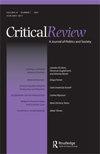柯林伍德思想中的历史与心理学
IF 1.7
3区 社会学
Q4 POLITICAL SCIENCE
引用次数: 0
摘要
柯林伍德的历史理解在于再现所研究的历史人物的思想,这一理论为人们所熟知。他对这一观点的第一次可识别的表达来自于对宗教的心理解释的空虚性的争论,在他的整个职业生涯中,科林伍德都把历史作为心理学的另一种选择。随着时间的推移,他关于宗教心理学不可能与宗教信仰的真实性相关的论点被心理学是自我破坏的论点所取代,因为心理学家将信仰归因于盲目的心理需求的过程可以同样容易地适用于心理学家本人。科林伍德认为这是一种自我挫败的心理立场,作为一种替代,他提出了将信仰的发展作为行动动机的研究,这使他提出了“所有的历史都是思想史”的观点,并且为了理解一个历史事件,我们必须在心理上重新制定其背后的思想。本文章由计算机程序翻译,如有差异,请以英文原文为准。
History Against Psychology in the Thought of R. G. Collingwood
ABSTRACT R. G. Collingwood is mostly remembered for his theory that historical understanding consists in re-enacting the thoughts of the historical figure whom one is studying. His first recognizable expression of this view followed from an argument about the emptiness of psychological interpretations of religion, and throughout his career Collingwood offered history as re-enactment as an alternative to psychology. Over time, his argument that the psychology of religion could not be relevant to the veracity of religious beliefs was supplanted by the argument that psychology is self-undermining because the psychologist’s procedure of attributing beliefs to blind psychic needs could apply just as easily to the psychologist him- or herself. As an alternative to what he took to be the self-defeating psychological position, Collingwood put forward the study of the development of beliefs as the motivations for actions, which led him to his views that “all history is the history of thought” and that, in order to understand an historical event, we must mentally re-enact the thoughts that stood behind it.
求助全文
通过发布文献求助,成功后即可免费获取论文全文。
去求助
来源期刊

Critical Review
POLITICAL SCIENCE-
CiteScore
1.30
自引率
12.50%
发文量
17
期刊介绍:
Critical Review: A Journal of Politics and Society is a political-science journal dedicated to advancing political theory with an epistemological bent. Recurrent questions discussed in our pages include: How can political actors know what they need to know to effect positive social change? What are the sources of political actors’ beliefs? Are these sources reliable? Critical Review is the only journal in which the ideational determinants of political behavior are investigated empirically as well as being assessed for their normative implications. Thus, while normative political theorists are the main contributors to Critical Review, we also publish scholarship on the realities of public opinion, the media, technocratic decision making, ideological reasoning, and other empirical phenomena.
 求助内容:
求助内容: 应助结果提醒方式:
应助结果提醒方式:


